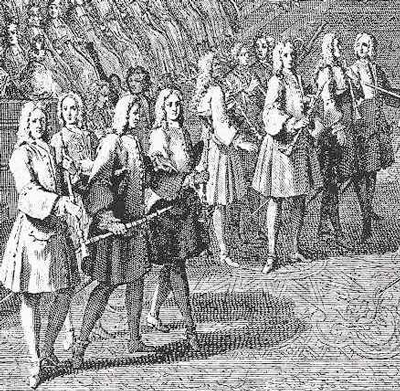by Daniel Hathaway

Baroque oboists Debra Nagy, Stephen Bard and Kathryn Montoya (taille or tenor oboe), baroque bassoonist Anna Marsh, baroque guitarist (and theorboist) Simon Martyn-Ellis and percussionist Michelle Humphreys marched on single-file playing Martin Hotteterre’s Marche des fussilliez, one of a series of pieces written as ceremonial music for Louis XIV’s musket-bearing horse brigades, each of which was outfitted with a similar “oboe band.”
As Les Délices’s director Debra Nagy pointed out, the program would go on to explore the somewhat permeable border between French ceremonial music and art music during the period when the oboe moved off the field and into the theater. For “The Musketeers,” she assembled a terrific group of players who are equally convincing in both kinds of music.
The entrance march flowed into three more pieces from a manuscript by André Philador, who maintained the Sun King’s music library and saw to the copying of scores. The Marches des Boulonnois, L’Assemblée and 4ème Air were in a similarly rousing style, the final Air a quick-time piece that showed off the oboists’ fleet finger and tongue work.
Double-reed players need to rest embouchures, so there were two entremets built into the program. First, Nagy and Montoya traded oboes for recorders for an alluring performance of a sonata by Jacques Martin Hotteterre (the second from his first book of trios). Later in the program, Martyn-Ellis took up the guitar again for three interesting movements from Robert de Visée’s sixth suite, explaining that the composer was on call to play for Louis while the monarch was strolling through the gardens of Versailles, or while he was in bed (for whatever reason).
Nagy and Marsh were featured in François Chauvon’s fifth suite from Tibiades, a standout for its unusual style and for its prominent bassoon lines, which Marsh played with woody elegance.
Another member of the Philidor family, Pierre Danican, was represented by his 6th suite from op. 1. The odd collection of movements included a “quirky” Caprice (Nagy), a syncopated Passepieds, an unusual fugue, and a Marche du Régiment de la Calotte, which, according to Nagy’s thorough program notes, was “not a branch of the army at all, but comprised of lieutenants and officers whose biting criticism of the ancient régime took the form of published satires.”
The final stop on this musical itinerary was the theater, where we heard the most distinguished music of the evening. Jean-Baptiste Lully’s score for Molière’s play, Le Bourgeois gentilhomme included a grand overture, a cheerful Canarie, two pieces that incorporated the contemporary fad for Turkish music, and an Air festooned with jazzy hemiolas, cultimating in an elegant Chaconne (des scaramouches, trivelins, et arleguin). Here, Michelle Humphreys, who had contributed tasteful percussion effects to earlier selections had the opportunity to add Turkish cymbals while alternating between two drums.
Debra Nagy’s clever programming and her rolodex of superb musicians produced yet another splendid Les Délices concert on Saturday evening. You won’t hear finer baroque wind playing anywhere — or another program like this one anytime soon.
The Musketeers will be repeated in Herr Chapel of Plymouth Church in Shaker Heights on Sunday, October 26 at 4:00 pm.
Published on ClevelandClassical.com October 26, 2014.
Click here for a printable copy of this article



